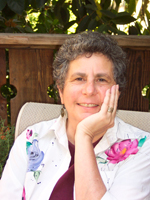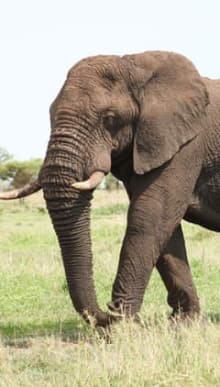Poems by Susan Cohen
Archives: by Issue | by Author Name

"If You’re Reading This, You Might Be a Baboon"
Headline in the Christian Science Monitor when scientists discovered baboons could be taught to recognize which letter patterns make words and which are gibberish.
by Susan Cohen
From Canary Summer 2014
Susan spends much of her time looking for birds in both the San Pablo Bay and the Bodega Bay watersheds of Northern California.

And you might be bristling as you read
the planet’s news after a rough night
in the Jackalberry tree,
when all you ever wanted
was your morning cuppa
and the harmless flesh
of roots, juicy fruit of baobab
before commencing your commute
across the savannah.
You might be studying the encyclopedia
of a waterhole, spelling out b-a-d weather
from the sky’s alphabet.
You might be reading up on humans
in the newly torn pages
of ancient jungles:
the hard truths of our macadam,
the visible clouds we belch
from our metallic shells,
our tracks that flatten grass,
the signs we post and mock
with bullet holes.
You might be trying to read your future,
puzzling over words
with silent endings.
© Susan Cohen
Beginning Birding
by Susan Cohen
From Canary Fall 2011

Before I found its page among the passerines,
I’d never seen a Black Phoebe.
I learned its family name means Tyrant Flycatcher;
and there it was outside my window, bullying insects!
It sallied off a phone wire — cursive flights
to make each midair snatch. The next day, too,
I saw one in the yard: sooty and white;
twitchy-tailed and crested. It said: seek, seek.
I saw another one next door, and when I strolled,
a Phoebe followed me gate to gate.
Black Phoebes waited everywhere I looked,
that obscure word you learn – then notice daily.
Though birds have no need to be written,
I felt I’d called Phoebes into being
from an alphabet of feather and full throttle.
How quickly it becomes about possession.
Soon, I was naming more birds into sight:
Let there be Bewick’s Wrens and Hairy Woodpeckers;
Rufous-sided Towhees, Yellow-rumped Warblers.
Let there be Sharp-shinned Hawks!
Previously published in Poetry East.
© Susan Cohen
How You Kill an Elephant
by Susan Cohen

In Africa, where they herd horizons and shuffle up the dust,
you can track their footprints and imagine the size of their lives—
their enormity, their gravity, how little their dailiness has to do
with you. Closer, they slow-walk as if each bears a burden,
and you can see their hides—creased treasure maps,
gray walls daubed with prehistoric handprints.
When they take turns tusking the soil for salt, or cross
the river in a line—trunks aloft, each baby a submersible—
you can move close enough. Then, if you want to kill
an elephant, you must aim for its abundant heart.
Later you can kneel, posed beside a mountain
of carcass that makes you look small.
© Susan Cohen
In Greenland the Ice Sheet
by Susan Cohen
From Canary Spring 2022

is pooling like tears
into the ocean
while we are too busy
planting the fossil beds with our own bones,
interred without ceremony.
When people die with no one to hold their hands
how can we be expected to mark the end of an ice sheet
that melted so fast—suddenly
beyond saving.
We have a surfeit of endings
we can’t embrace in our arms, griefs
that we dare not sing in congregation.
We are the sled dogs who slog along tracks,
knee deep in new ice-melt,
head-down and flooded with mourning.
All along we mistook a slippery future
for something we could walk across, the solid form of water
that began spilling
its dirges into the rhythm of waves.
Meanwhile, the gravitational field shifts over Greenland,
glaciers become waters
and oceans become troughs for the water’s dead weight.
Seas rise up and our children are stranded
in their one time to live,
the way polar bears swim now
with no place to go, exhausted
as we are.
Previously published in Catamaran Literary Reader
© Susan Cohen
Reading the Leopard
by Susan Cohen

Its skin in early daylight
was like an illuminated manuscript,
though its eyes held us off, illegible.
One leap into the Jackalberry tree
beside our Land Rover—
then it slid along a limb above us,
where its strip of stinking meat
hung like jerky. No one moved
except to breathe. Only when it headed
down the bark, vertical as a lizard,
last night’s kill in its jaws,
did we recognize the leg and foot
of a baby elephant flopping
with each step the leopard took
back into the bush. Not right, not wrong,
just the fly-blown standard grammar
nature puts into a cat’s mouth—
the elephant’s leg, loose
and linear as the letter l.
© Susan Cohen
Reading the Leopard
by Susan Cohen
From Canary Spring 2020

Its skin in early daylight
was like an illuminated manuscript,
though its eyes held us off, illegible.
One leap into the Jackalberry tree
beside our Land Rover—
then it slid along a limb above us,
where its strip of stinking meat
hung like jerky. No one moved
except to breathe. Only when it headed
down the bark, vertical as a lizard,
last night’s kill in its jaws,
did we recognize the leg and foot
of a baby elephant flopping
with each step the leopard took
back into the bush. Not right, not wrong,
just the fly-blown standard grammar
nature puts into a cat’s mouth—
the elephant’s leg, loose
and linear as the letter l.
© Susan Cohen
Verge
by Susan Cohen
From Canary Fall 2019

Black night, and an opossum
on the country highway
shuffles as fast as it can,
its cumbrous walk taking it
to the grass verge or else
to heaven in a cloud of diesel.
Cars gun by, the creature ashen
in each headlight—a flare
any tire might squelch.
We slew wide and miss it,
hoping the drivers behind us
also swerve. At least
it won’t be us—no thud,
no small regret—diminishing
an already thinning world.
We leave the opossum
where we found it, not yet
to the verge, though on it.
© Susan Cohen